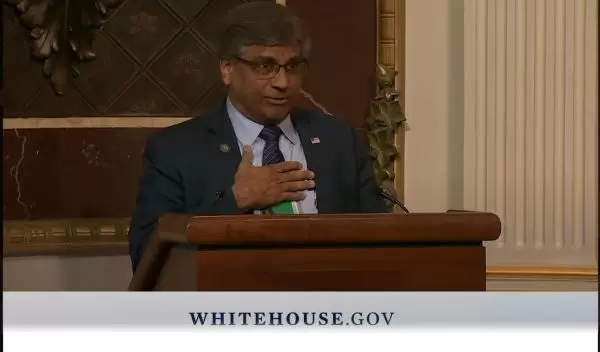
NSF Director participates in the White House Office of Science and Technology Policy event on President’s Budget request for FY24
On March 13, U.S. National Science Foundation Director Sethuraman Panchanathan participated in the White House Office of Science and Technology Policy (OSTP) event on President Biden’s FY24 Budget request which includes $210 billion for federal research and development (R&D), the largest ever investment for federal R&D.
Panchanathan thanked the Administration and Congress for their continued support saying, “This is an investment in NSF’s ability to support even more individuals, generate more breakthroughs, and foster more innovations that are going to strengthen our economy, national security, and global competitiveness”.
The President’s historic commitment to federal R&D investment is a recognition that American science, technology and innovation—and the people that fuel it—are key to achieving our nation’s great aspirations: ensuring robust health and plentiful economic opportunity for every person; tackling the climate crisis and transitioning to clean energy; investing in creating the industries of tomorrow; and advancing global security and stability.
The President's Budget:
- Supports new federal R&D entities to spur innovation. The Budget requests $1.2 billion for the CHIPS and Science Act-authorized Directorate for Technology, Innovation, and Partnerships within NSF to help accelerate and translate scientific research into innovations, industries, and jobs.
- Makes historic investments in American innovation and emerging technologies. The Budget provides $25 billion for CHIPS and Science Act-authorized activities, including $21 billion for the three primary CHIPS and Science Act agencies: NSF, the Department of Energy’s (DOE) Office of Science, and NIST within the Department of Commerce. The Budget includes $2 billion at NSF to help maintain America’s edge in the industries of tomorrow, including advanced manufacturing, advanced wireless, artificial intelligence, biotechnology, microelectronics and semiconductors, and quantum information science. The Budget also restores American innovation in agriculture by providing more than $4 billion for agricultural research, education, and outreach.
- Makes historic investments in climate science and cutting-edge clean energy innovation. The Budget provides $16.5 billion to support climate science and clean energy innovation, proposing $5.1 billion to fund a broad portfolio of research to improve understanding of our changing climate and inform adaptation and resilience measures across multiple agencies. The Budget supports U.S. preeminence in developing innovative technologies that accelerate the transition to a clean energy economy by investing more than $11.3 billion to boost American innovation and reestablish American leadership in clean energy innovation. This includes over $4 billion in research, development, and demonstration activities across multiple agencies for game-changing technologies where transformative progress can help the U.S. reach its net-zero 2050 climate goal and support global decarbonization, including $1 billion to advance fusion energy.
- Promotes regional technology innovation and job creation. The Budget provides $300 million for NSF’s Regional Innovation Engines program, bringing together State and local governments, institutions of higher education, labor unions, businesses, and community-based organizations across the Nation to galvanize use-inspired research, technology translation, and workforce development.
- Expands science, technology, engineering and mathematics (STEM) workforce and institutional capacity and advances racial and gender equity in STEM. The Budget provides $1.4 billion at NSF to accelerate STEM education and workforce development, and to help ensure the U.S. science and technology workforce reflects the nation as a whole. In addition, the Budget includes $420 million at NSF to increase: the participation of historically underrepresented communities and women and girls in science and engineering fields; support for curriculum design; research on successful recruitment and retention methods; development of outreach or mentorship programs; fellowships; and science and engineering research and education capacity at Historically Black Colleges and Universities, Tribally Controlled Colleges and Universities, and Minority-Serving Institutions. The Budget also includes $350 million at the Department of Education to expand research and development infrastructure at these institutions.
